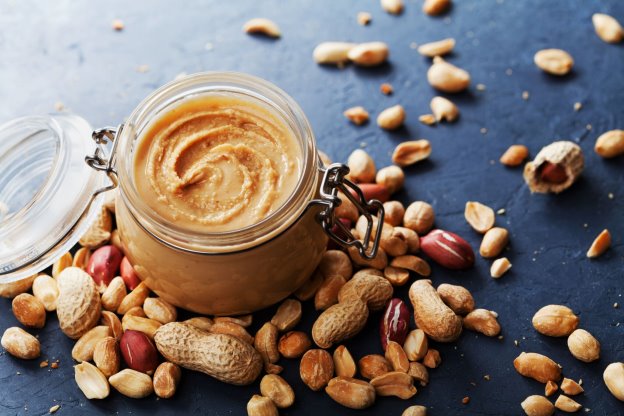| Research Reveals Daily Dose of Peanuts Delivers Body and Mind Benefits Americans Encouraged to Pause for PeanutsAlbany, Ga. (September 14, 2020) – For a health routine boost, add a dose of peanuts. Research shows pausing daily for peanuts or peanut butter does a body and mind good. Peanuts are a superfood so just a small amount can fend off mid-morning hunger, help eliminate the afternoon slump and deliver much-needed brainpower.To encourage better health, The Peanut Institute is launching a week-long Pause for Peanuts program that kicks off on September 13, National Peanut Day. For seven days, the institute is suggesting everyone take a break to toss back some peanuts or enjoy a spoonful of peanut butter. “Research around the world has found that eating peanuts or peanut butter on a daily basis delivers numerous benefits, including sustained energy, improved mental cognition and, overall, a longer and healthier life,” says Samara Sterling, Ph.D., director of research for The Peanut Institute. “Specifically, regular peanut consumption has been associated with a reduced risk of heart disease, diabetes and numerous kinds of cancer.” Peanut Protein Fuels the DayFor those who are looking to ward off hunger, an ounce of peanuts packs more protein than any other nut.1 A single serving of approximately 35 peanuts delivers seven grams of plant-based protein along with fiber and healthy fats, all of which contribute to satiety. In addition, peanuts stimulate peptide YY, a hormone that decreases appetite.“A study published in the British Journal of Nutrition found that participants who ate just three tablespoons of peanut butter with breakfast had a lower desire to eat 8-10 hours later,” explains Dr. Sterling. “Peanuts also have a low glycemic index that helps stabilize blood sugar to prevent the feeling of ‘crashing’ in the afternoon.”Snacking between meals is another way to avoid sluggishness. Dr. Sterling supports smart snacking that delivers nutritional benefits. For example, she suggests trading out a high-carbohydrate or “empty calorie” snack like pretzels with a serving of nutrient-dense peanut butter and carrots. “A healthy snack is a powerful tool that can deliver a much-needed boost of energy any time of the day,” says Dr. Sterling. More Power for the BrainThe benefits of peanut and peanut butter consumption go beyond the body and reach the brain.In addition to protein, a single serving of peanuts is packed with 19 vitamins and minerals, including the antioxidant resveratrol, which has been shown to increase blood flow to the brain.2 Peanuts also contain high levels of niacin and are a good source of vitamin E – two nutrients that support brain health and have long been known to protect against Alzheimer’s disease and age-related cognitive decline.3 Overall HealthPeanuts deliver both short-term and long-term health benefits. Research shows eating peanuts twice a week can reduce the risk of premature death by 12%4and reduce the risk for certain cancers, including colorectal, gastric, pancreatic and lung cancers5. Regular consumption can also reduce the risk of death due to heart disease by 24%, respiratory disease by 16%, infections by 32% and kidney disease by 48%.4“The advantage of peanuts is the fact that just a small amount can deliver significant benefits. What’s more, peanuts and peanut butter are affordable and convenient so they’re easy to incorporate into a daily diet,” says Dr. Sterling.For more information on the Pause for Peanuts program, visit peanutinstitute.com. The Peanut Institute website also features recipes that cover all parts of the day -- breakfast, lunch, dinner, dessert and snacks. # # #Sources:1. U.S. Department of Agriculture, Agricultural Research Service. 2013, USDA National Nutrient Database for Standard Reference, Release 26. Nutrient Data Laboratory Home Page, http://www.ars.usda.gov/ba/bhnrc/ndl.2. Kennedy DO, Wightman EL, Reay JL et al. Effects of resveratrol on cerebral blood flow variables and cognitive performance in humans: a double-blind, placebo-controlled, crossover investigation. Am J Clin Nutr. 2010;91(6):1590-97.3. Joseph JA, Fisher DR, Cheng V, Rimando AM and Shukitt-Hale B. Cellular and behavioral effects of stilbene resveratrol ana- logues: implications for reducing the deleterious effects of aging. J Agric Food Chem. 2008;56(22):10544-51.4. Bao Y, Han J, Hu FB. Association of nut consumption with total and cause-specific mortality. N Engl J Med. 2013;369:2001-11.5. Zhang D, Dai C, Zhou L, et al. Meta-analysis of the association between nut consumption and the risks of cancer incidence and cancer-specific mortality. Aging (Albany NY). 2020;12(11):10772-10794. doi:10.18632/aging.103292.  |

September 14th, 2020